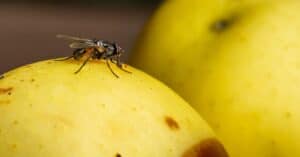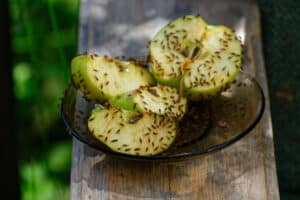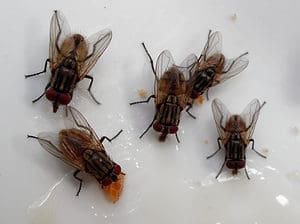Any time the weather gets warm enough, people want to go outside. However, flies can interrupt picnics, barbeques, and other outside activities. As soon as a fly lands on someone’s sandwich, they’re bound to wonder what they can do to get rid of the insects quickly. Discover how to get rid of flies outside quickly and easily with several fast-acting different methods.
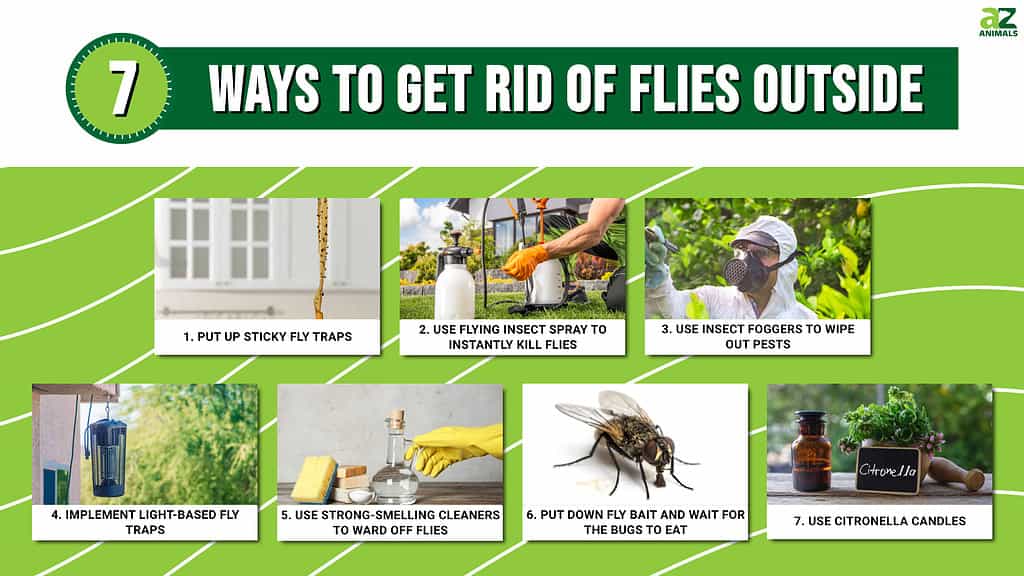
Making Your Outside Area Less Attractive to Flies
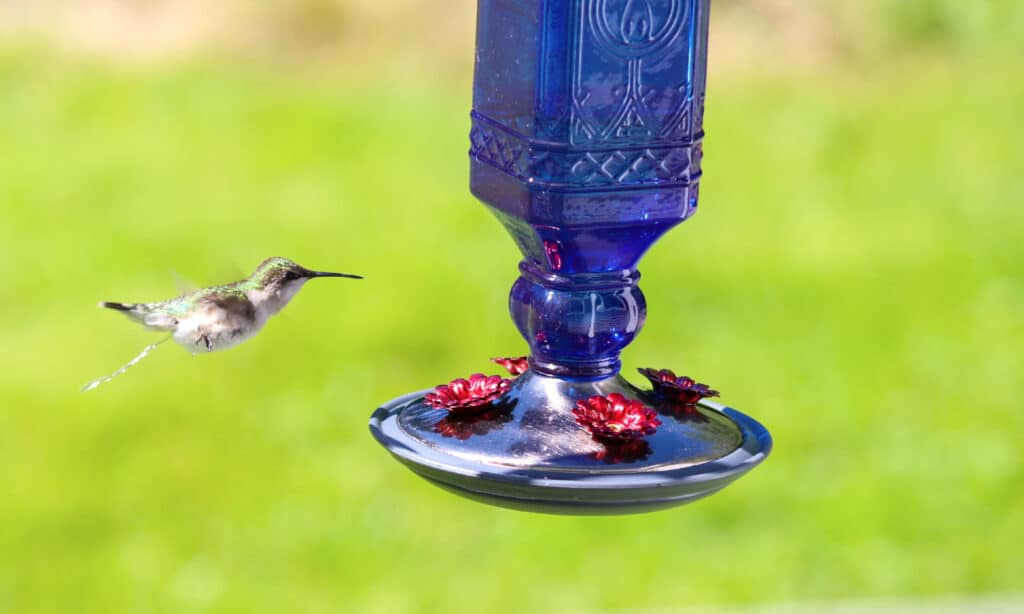
Flies congregate around bird feeders, so it’s a good idea to move them.
©Eleanor McDonie/Shutterstock.com
The saying goes that an ounce of prevention is worth a pound of cure. So, the first thing you can do to get rid of nuisance flies outside instantly is to take away the things that are attracting them to your property. Getting rid of their reason for coming to your patio could solve the problem before it starts.
So, what reasons do flies have for coming to your lawn and patio area? Flies are attracted to fresh food, drinks, decaying foods, feces, and more. Simply put, they’re trying to eat.
Reducing flies in your yard could be a matter of:
- Moving your trash cans farther away from the patio
- Cleaning up pet feces instead of letting them sit
- Moving bird feeders farther away from your home
- Frequently cutting your grass and trimming brush to reduce hiding spots
- Removing sources of standing water
Performing these tasks can give flies fewer reasons to stay around your home, cutting down on the number of flies that stick around.
7 Ways to Get Rid of Flies Outside
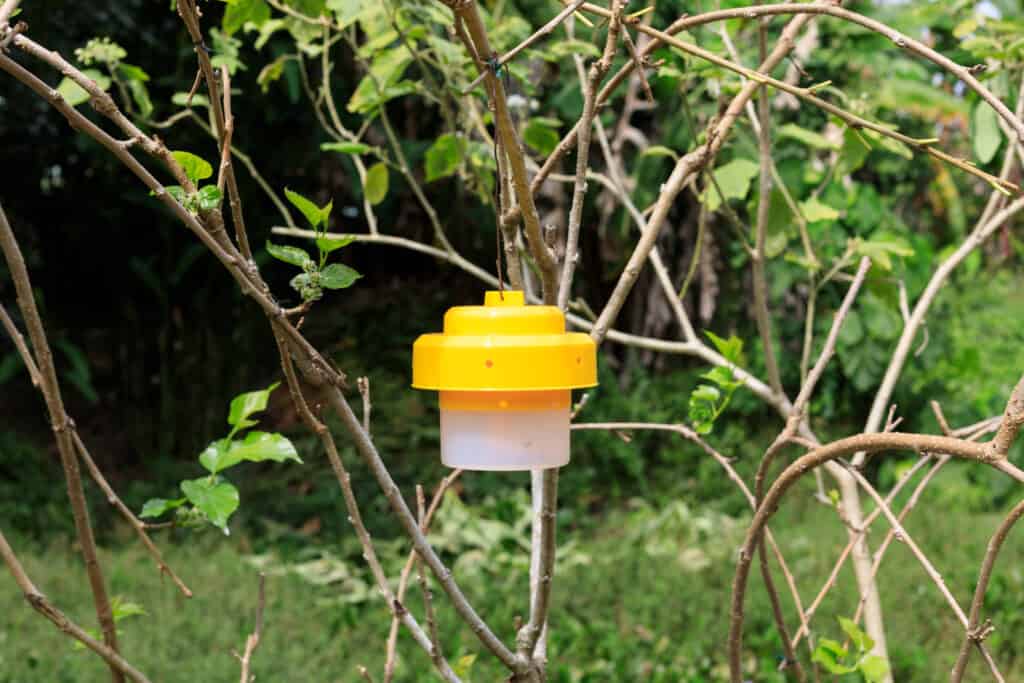
Ecological insect and fly traps in the garden can help reduce the number of flies.
©TaTum2003/Shutterstock.com
Many methods exist to help you get rid of flies outside instantly. Other ways to cut down on these pests may take some time. Your best bet is to use a combination of approaches along with preventative measures to reduce the number of flies around your patio. Use these techniques to quickly rid your area of flies.
1. Put Up Sticky Fly Traps
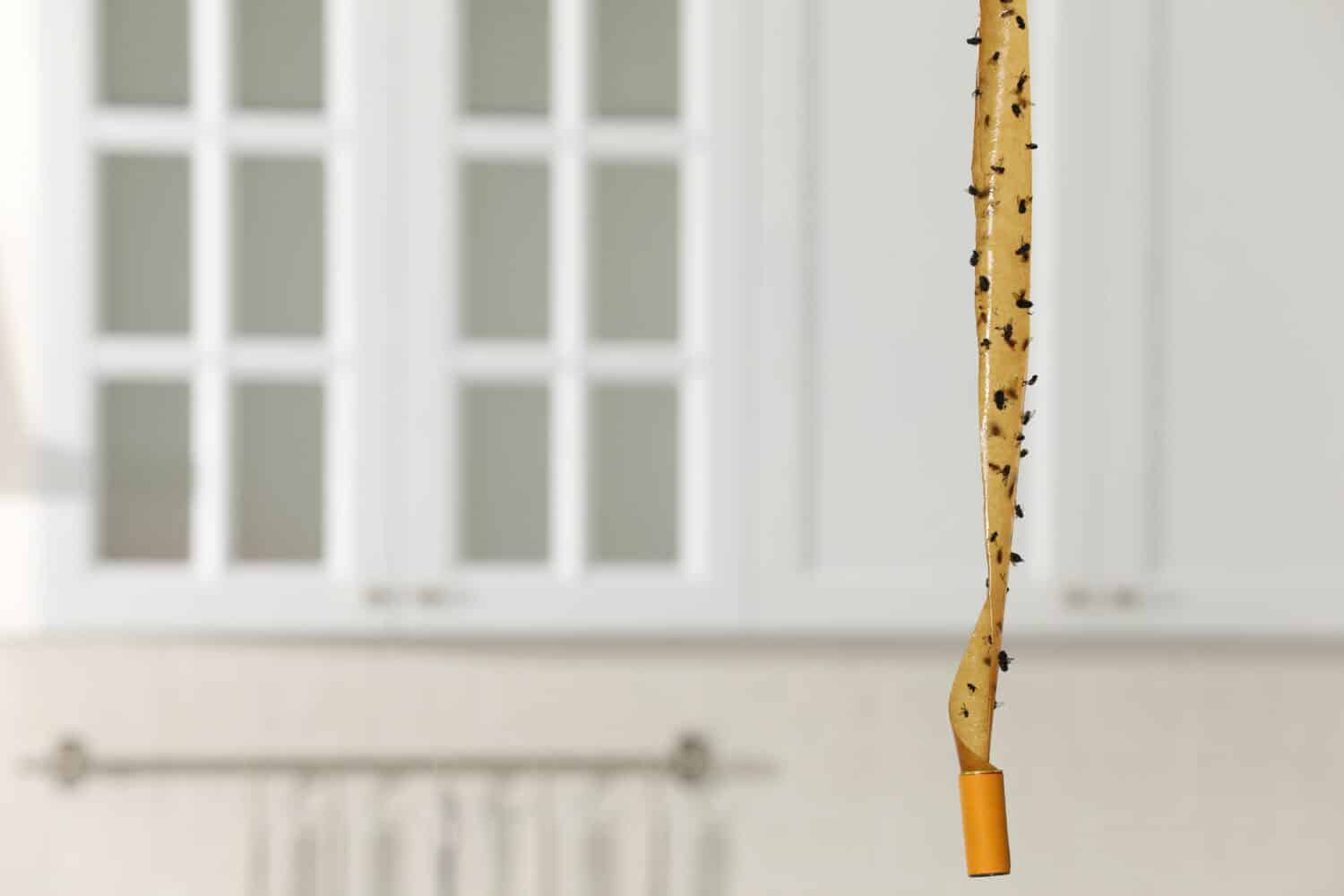
Sticky fly traps may smell bad, but they deliver great results.
©New Africa/Shutterstock.com
Sticky fly traps are unpleasant because they have a powerful scent. Yet, few things attract the flies in your yard to one area faster than these. Once they flock to these sticky traps, the flies will get stuck to them, resulting in their demise. While unpleasant, these traps can clear a patio area very quickly.
2. Use Flying Insect Spray to Instantly Kill Flies
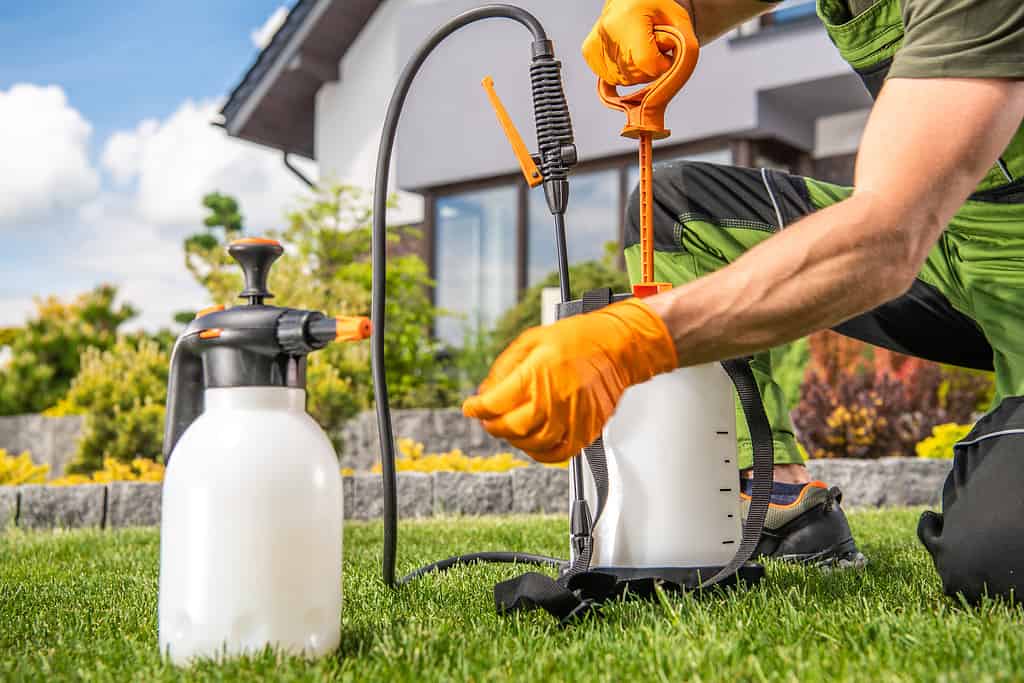
Commercial varieties of flying insect killers typically affect the creature’s body via a neurotoxin.
©welcomia/iStock via Getty Images
If you have a concentration of flies that are particularly interested in your outdoor trashcan, you can always spray them with flying insect killers. Commercial varieties of flying insect killers typically affect the creature’s body via a neurotoxin. Once sprayed, the flies will not be able to move their muscles and will pass away. Oftentimes, this happens in seconds. The only downside is that you’ll have to keep interrupting your activities to spray the flies.
3. Use Insect Foggers to Wipe Out Pests
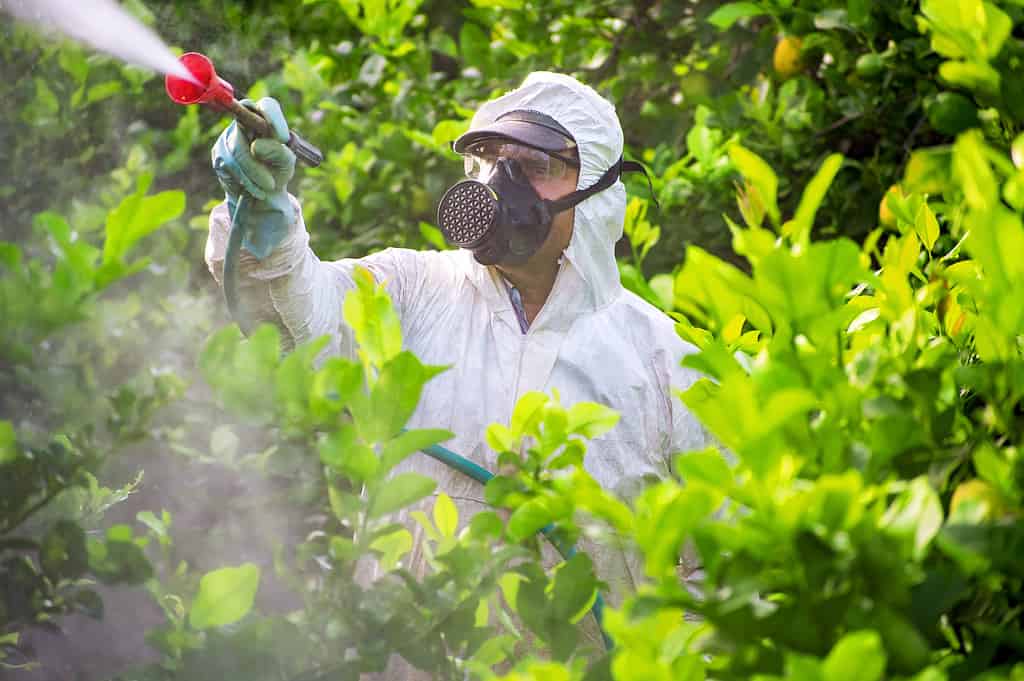
Once fogger is utilized, flies will stay away for anywhere from hours to weeks.
©Worledit/ via Getty Images
Another chemical option to get rid of flies outside instantly is a fogger. Outdoor foggers for flying insects use the same principle as indoor roach foggers. The main difference is that a person applies these via a spray, and they can only be used on calm days or the mist will blow away. Once you spray an area with the fogger, flies will stay away for hours, days, or weeks according to some brands. The spray will immediately kill or drive away any flies in the area.
4. Implement Light-Based Fly Traps
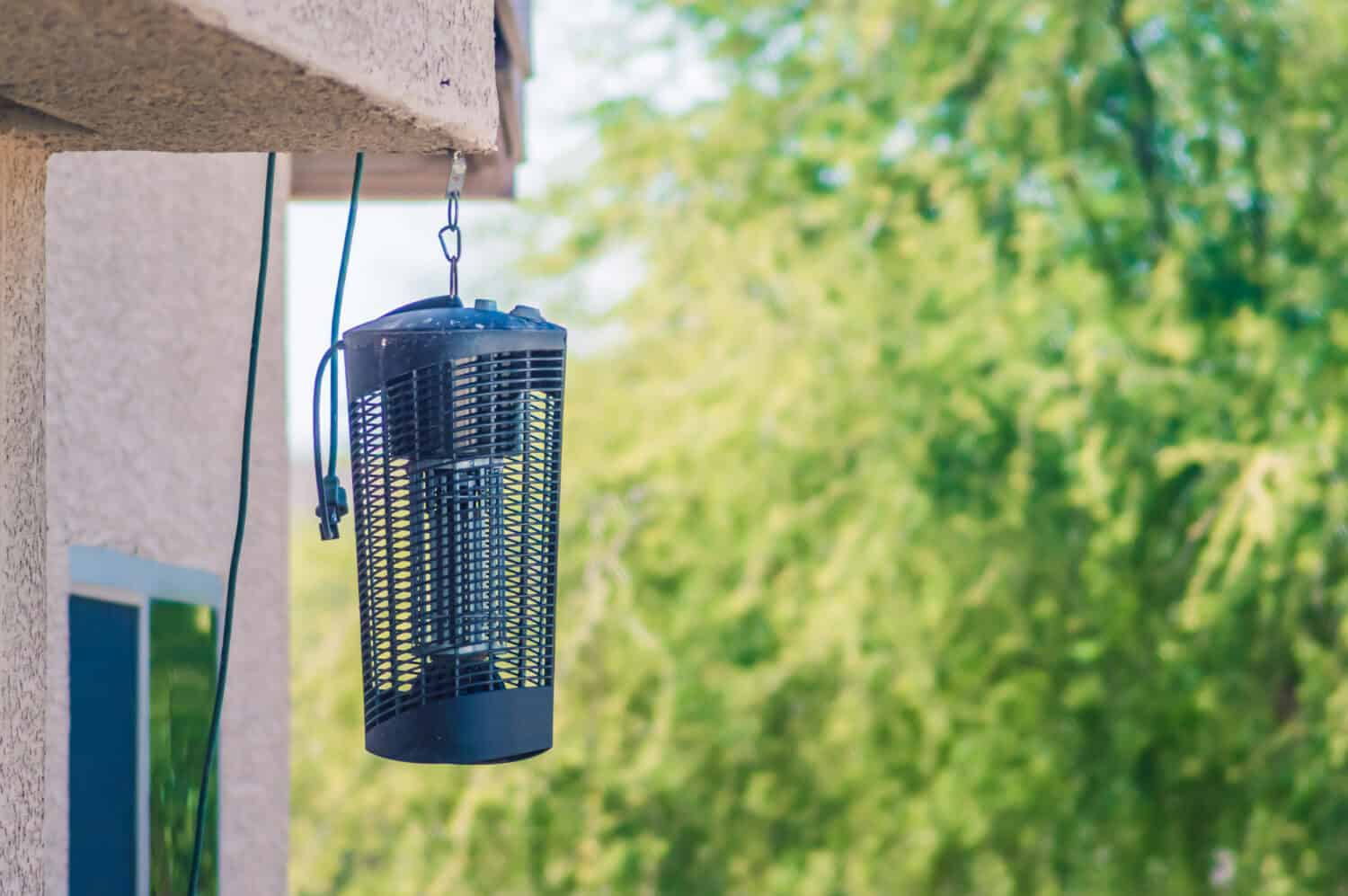
Bug zappers are a long-lasting, effective way to reduce fly populations in your yard.
©GreatSnapz/Shutterstock.com
Flies are naturally attracted to bright lights. So, if you are sitting on your patio at night, using a light-based fly trap can be a great way to clear the yard. Of course, these light traps do not instantly kill a dozen flies. However, they will leave you and your guests alone to focus on the light and slowly dwindle in numbers. Once they strike the trap, they’re zapped by electricity and die.
You can leave the light on after you go inside to let the trap do its work all night, so you wake up to fewer flies in the morning.
5. Use Strong-Smelling Cleaners to Ward Off Flies
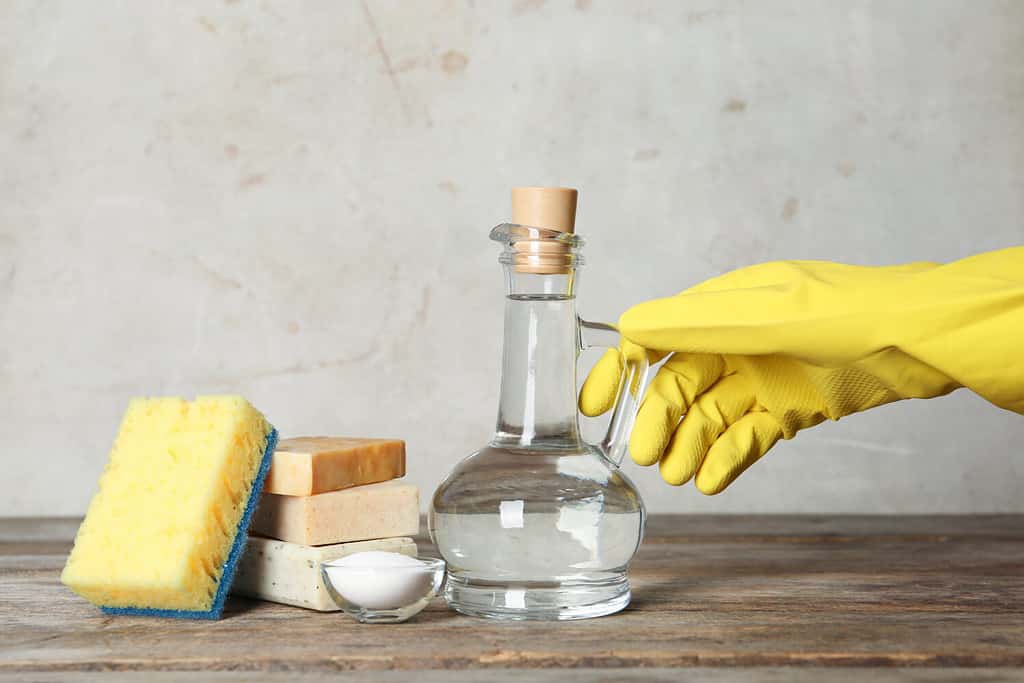
The scents of some cleaning supplies such as pine oil are natural repellents to flies.
©New Africa/Shutterstock.com
Flies dislike the scent of pine oil. Naturally, it is smart to use their dislikes against them to make them leave your backyard. While it is not a good idea to spray undiluted pine oil around your backyard, you can use a diluted mixture in some areas.
Try mixing a cleaner with pine oil or pine oil itself in a 50/50 mixture with water. Use that to wipe down tables and chairs or to spray in places where flies congregate. They should disperse soon after.
6. Put Down Fly Bait and Wait for the Bugs to Eat
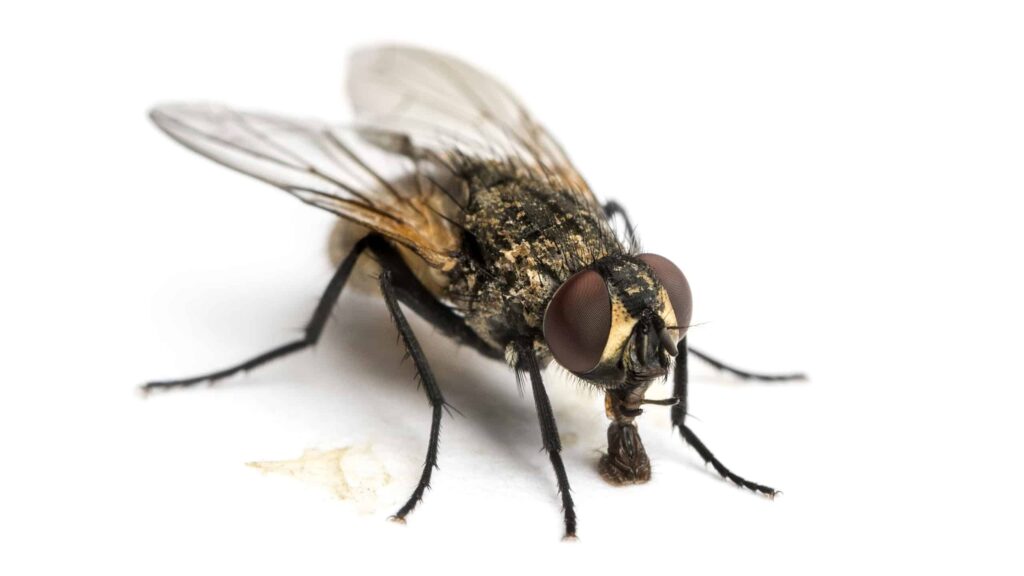
Fly bait can help in cases where a home infestation has occurred.
©Eric Isselee/Shutterstock.com
Severe fly infestations can warrant the use of fly bait. However, fly bait is harmful to humans and animals that consume it. That means you should only put this down in places where you have problems with flies that children and pets cannot access.
Once you scatter this bait, flies will consume it believing that they have stumbled upon a tasty morsel. After they eat it, the flies will start rapidly dying off. This type of fly bait is often criticized for its indiscriminate killing of wildlife, though. It is best to use this as a last resort.
7. Use Citronella Candles

The smell of a citronella candle will temporarily drive off flies.
©rawf8/Shutterstock.com
Burning a citronella candle is a good way to get flies to leave an area. These are simple tools that work with various levels of efficacy. However, if you want to get rid of flies outside instantly, light a few of these types of candles or torches. The biggest problem is that the flies will return to whatever food or scent attracted them to your yard after the scent dissipates. Citronella candles are best used in conjunction with other tools to remove flies from your patio.
Getting rid of flies outside can be a challenge. However, several preventative and proactive measures can be used together to reduce their populations outside your home. Of course, getting rid of flies inside your home is another challenge altogether, but the process can use similar measures. Be ready to change some elements of your life, like where you store your garbage, to stop flies from disrupting a nice barbeque.
Summary of How to Get Rid of Flies Outside Instantly
| # | Method | Effectiveness | Downside |
|---|---|---|---|
| 1 | Sticky Fly Traps | Works quickly | Unpleasant smell |
| 2 | Flying Insect Spray | Works quickly | Must repeat after smell dissipates |
| 3 | Insect Foggers | Works quickly and lasts for days or weeks | Must repeat |
| 4 | Light-Based Fly Traps | Works well but not immediately | Requires electricity |
| 5 | Strong-Smelling Cleaners | Works quickly | Unpleasant if you don’t like the smell |
| 6 | Fly Bait | Works on severe infestations | Harmful to humans and animals |
| 7 | Citronella Candles | Works quickly | Flies come back as soon as the candle goes out |
What Smells Keep Flies Away?
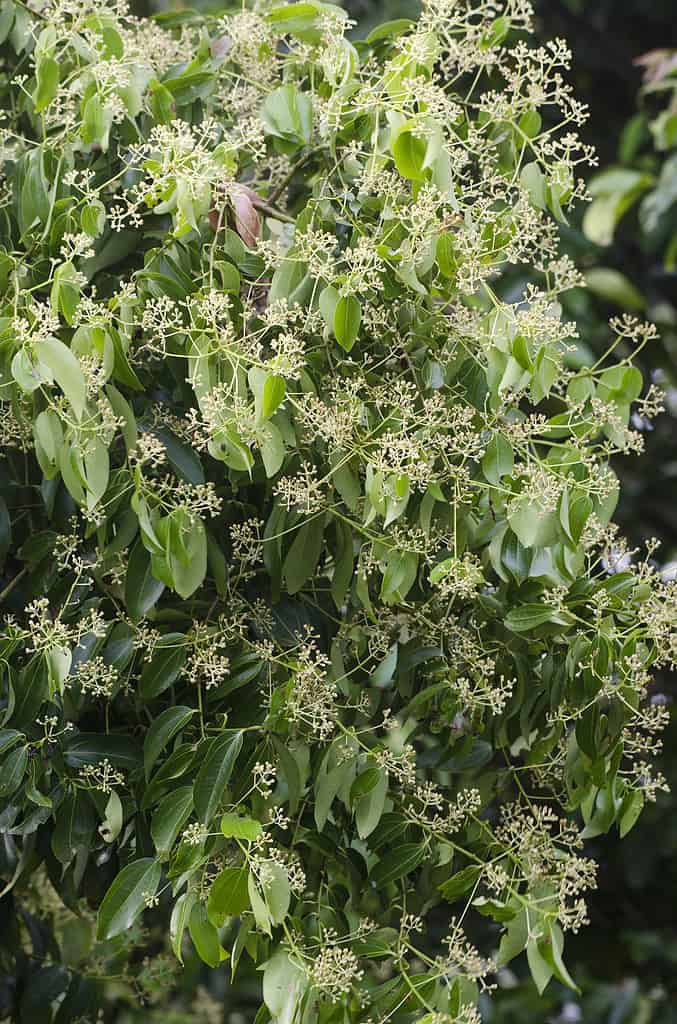
Cinnamon is derived from the inner bark of several tree species from the genus
Cinnamomum.
©Augustus Binu, CC BY-SA 3.0 – License
If you wish to use natural methods to prevent flies from hanging around outside your home, there are a multitude of scents, in addition to citronella, that they do not like and will work at keeping them away. You can not only spray them around the yard but inside your home as well and it will emit pleasant aromas for you while deterring the fly from remaining. Here are a few natural scents that you can either use in plant form to grow around your area or use as essential oils:
- Peppermint/Spearmint
- Lavender
- Lemongrass
- Cayenne Pepper
- Eucalyptus
- Cinnamon
Many of these herbs and plants grow fairly quickly and can be kept both indoors and outdoors. Should you want to use them as a spray, you can find them as essential oils or even create your own mixture, as in the case of cayenne pepper. These scents are very overpowering, especially cinnamon which can also have parts that are rather toxic to flies.
Will Vinegar Get Rid of Flies Outside?

Vinegar can be used in combination with other household items such as dish soap to get rid of house flies.
©focal point/Shutterstock.com
While vinegar is one of those miraculous household items that can work wonders on so many different issues like stains, odors, and hard-to-clean areas, in the case of repelling flies it does not keep them away. In fact, vinegar actually attracts flies. If that is true, then how can vinegar be a useful household item to get rid of them?
The genius of using vinegar is to use it as a natural bait for flies rather than as a repellent, and then incorporating it with something that will actually take them out for good. A great material to partner with vinegar is dish soap. As the vinegar attracts the insects and causes them to land on the concoction, the dish soap will effectively draw the bugs downward to the bottom and drown them.
The photo featured at the top of this post is © iStock.com/Phichaklim1
Thank you for reading! Have some feedback for us? Contact the AZ Animals editorial team.



